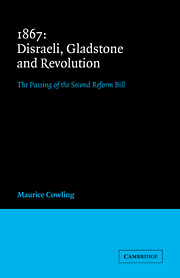Book contents
- Frontmatter
- Contents
- Preface
- Dedication
- Introduction
- I Prelude
- II Preliminary: The uprooting of the Whigs
- III The cornering of the Conservative party
- IV The reassertion of Conservative policy
- V The destruction of Liberal unity
- VI The victory of Disraeli
- VII The public agitation
- VIII The acceptance of Hodgkinson's amendment
- IX Conclusion: Palmerston's mantle
- Epilogue: The limitations of historical knowledge
- Appendixes
- Bibliography
- Notes
- Index
VII - The public agitation
Published online by Cambridge University Press: 18 December 2009
- Frontmatter
- Contents
- Preface
- Dedication
- Introduction
- I Prelude
- II Preliminary: The uprooting of the Whigs
- III The cornering of the Conservative party
- IV The reassertion of Conservative policy
- V The destruction of Liberal unity
- VI The victory of Disraeli
- VII The public agitation
- VIII The acceptance of Hodgkinson's amendment
- IX Conclusion: Palmerston's mantle
- Epilogue: The limitations of historical knowledge
- Appendixes
- Bibliography
- Notes
- Index
Summary
‘The [Reform] question is the sole property of Liberals, because they alone are conscious of and sympathize with the claims which Reform is needed to satisfy.’
Morning Star, October 8 1866In attempting to disentangle the objectives towards which the creators of the public agitation were directing events between 1865 and 1867, it is necessary to distinguish between the substantive objectives of their policies and the tactical purposes by which the objectives were surrounded. This is obviously necessary in dealing with parliamentary politicians; it is no less necessary in evaluating the activities of those whose centre of power lay outside Parliament. It is necessary in the case of Bright, whose mind and manner were conditioned by an acute sense of parliamentary possibility. It is necessary in the case of the Reform League, the Reform Union, the London Working Men's Association and the London Trades Council. It is necessary in all these cases because, although all wanted a Reform bill at some time in the future, there were significant differences about scope and timing which made the Reform agitation a more miscellaneous alliance than is suggested by the manifest unity it was able to maintain between July 1866 and April 1867.
In the first place, there is a distinction between the Reform Union style of organization on the one hand and the Reform League style of organization on the other. The Reform League and the London Working Men's Association had a working-class membership which was led, for its purposes and theirs, by an intelligensia of middleclass and ex-working class journalists, litterateurs and professional organizers, many of whom were short of money and some of whom wanted, more than was thought suitable, to keep their own hands on subscriptions raised from benefactors.
- Type
- Chapter
- Information
- 1867 Disraeli, Gladstone and RevolutionThe Passing of the Second Reform Bill, pp. 242 - 266Publisher: Cambridge University PressPrint publication year: 1967



